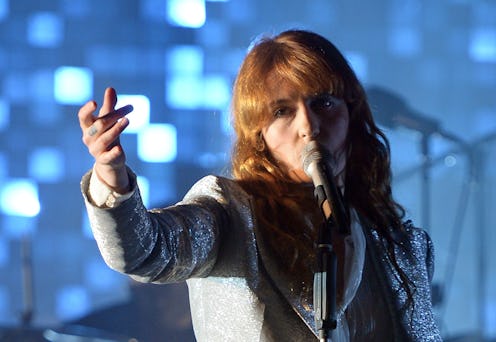Entertainment
Could Florence Welch Win Her First Grammy?
Florence Welch is a millennial's Janis Joplin, and it's her latest album as Florence + The Machine, How Big, How Blue, How Beautiful , that cements that status. The jarring, jangly guitar line that bursts forth on "What Kind of Man" does it, I think. As the album cover would suggest — Welch stares darkly forth from the image, hand dangled below her chin, dressed in black and rendered in black and white — it's a musician at her most direct. Her songs and albums up to 2015 had embraced a sort of witchy Stevie Nicks mysticism. Welch's most recent work is still that, but it exists beneath a veneer of the kind of '60s American rock Joplin exemplified. And while still a massive success, the singer's efforts haven't capitalized on the early promise of Lungs, making her a worthy dark horse at next year's Grammy ceremonies.
I was still in high school when Florence + The Machine's debut Lungs crept into my awareness. At first it was a low buzz of excitement on Tumblr; then "Dog Days Are Over" featured in the 2009 Skins episode "Effy" and "You've Got the Love" in the pilot of Misfits. Somewhere in between, I got my hands on the record and from the first chimes of harp on "Rabbit Heart (Raise It Up)" I was in. Deep in. "Drumming Song" was an early radio hit in the U.K., and growing up in a British territory, I had enough English friends that my delight in all things Florence Welch was only reinforced. Cult-like in our reverence, we all wanted to be a part of the macabre candlelit ritual she seemed to preside over.
Lungs earned Welch a Best New Artist nod at the 2011 Grammy Awards. By that time, Lungs was too old to be eligible for itself, and perhaps Florence + The Machine itself was a bit stale because she lost out to singer-bassist-cellist Esperanza Spalding. (The field also included Mumford and Sons, Justin Bieber, and Drake, so wrap your head around that one.) Perhaps buoyed by the recognition, Florence + The Machine released Ceremonials the next year. All that mysticism came to a head on the sophomore album, but I felt alienated rather than welcomed. It was too big — the intimate ritual had turned into a massive revival. I may have been alone; Ceremonials was nominated for Best Pop Vocal Album in 2012, and hit single "Shake It Out" for Best Pop Duo/Group Performance.
So now it's 2015, and after two musically, critically, and popularly huge albums Florence Welch has yet to be awarded one of the top accolades in the music industry. How Big, How Blue, How Beautiful was nominated for the Mercury Prize, the British analogue to Album of the Year at the Grammys, alongside Aphex Twin's Syro and Jamie xx's In Colour — but the big names fell to pianist-singer-songwriter Benjamin Clementine's At Least For Now. However, the nomination shows that Welch is still on the radar of various awards committees, and the Grammys may have already taken note.
How Big, How Blue, How Beautiful is not the most adventurous record of 2015. It's not political and powerful like To Pimp A Butterfly; it doesn't reinvent an artist like 1989. Yet it's transformative in a different way. It synthesizes binaries, raw yet polished, rock and soul all rolled into one. Welch's lyrics have always been obscure, and that has not changed on How Big, How Blue, How Beautiful. She opens "What Kind Of Man" with a compelling, mysterious image:
I was on a heavy tipTryna cross a canyon with a broken limbYou were on the other sideLike always, wondering what to do with lifeI'd already had a sipSo I'd reasoned I was drunk enough to deal with it
The spiritual influences only become clearer as the song progresses — Welch's music has always seemed devotional to her own private belief system. "It's a different kind of danger / And the bells are ringing out / And I'm calling for my mother / As I pull the pillars down," she sings on "Delilah," evoking Biblical storytelling. Lyrically, How Big, How Blue, How Beautiful keeps to the same imagery and literary devices that won me over back on Lungs. Welch writes well, but she's most convincing howling out the words over a drumbeat that carries the music forward.
She's grown up with us. Her voice has matured, and her influences have become less overt and more seamlessly incorporated into her own work. How Big, How Blue, How Beautiful will not, as predictions hold right now, make it into any of the general honors categories. But it might be considered for Best Pop Vocal Album, that award that Ceremonials almost seized three years ago. It's Florence, back and bigger and barer than ever, and it's not an obvious choice, but worthy of the accolade.
